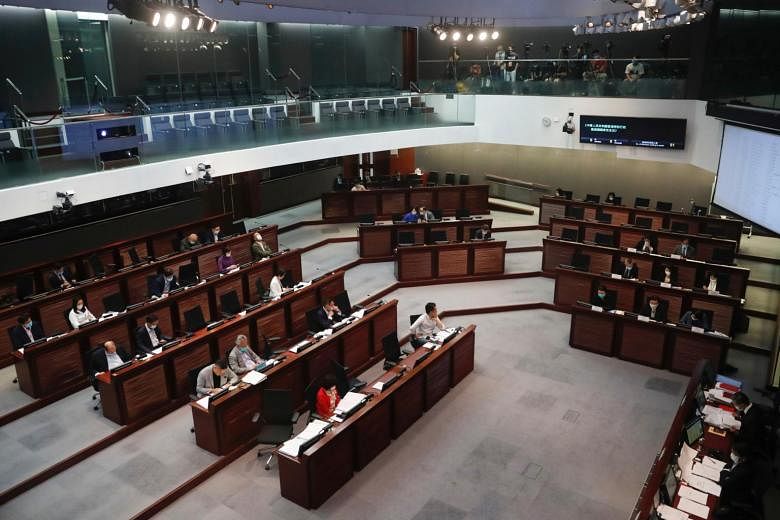BEIJING - China's top lawmakers on Tuesday (Aug 11) agreed to extend the term of Hong Kong's current Legislative Council (LegCo) by at least a year, putting an end to a legislative vacuum in the territory, state media reported.
LegCo elections were initially scheduled for Sept 6 but were postponed by a year because of the coronavirus pandemic.
"After Sept 30, 2020, the sixth Legislative Council of (Hong Kong) will continue to perform its duties for no less than one year until the beginning of the term of the seventh Legislative Council of Hong Kong," the National People's Congress Standing Committee said at the end of its four-day meeting, the official Xinhua news agency reported.
Hong Kong's Chief Executive Carrie Lam had on July 31 used a colonial-era emergency law to postpone the election to Sept 5 next year, citing the pandemic.
The city on Tuesday reported 33 new coronavirus infections, a marked drop from the spike in numbers in recent weeks.
The decision by the standing committee was welcomed by the Cabinet-level Hong Kong and Macau Affairs Office (HKMAO) and Beijing's liaison office in Hong Kong.
It shows the central government and 1.4 billion people of China "have always cared for, cherished and been the most considerate towards Hong Kong", the HKMAO said, according to Xinhua.
The central government's Hong Kong liaison office said the decision ensures society concentrates on getting the coronavirus outbreak under control.
Mrs Lam expressed gratitude to the National People's Congress Standing Committee for its decision, saying that it puts an end to a possible legislative vacuum in the city should the LegCo be dissolved before a new one is elected.
"(The decision) not only maintains the constitutional and legal order of the HKSAR (Hong Kong Special Administrative Region), but also ensures the normal governance of the HKSAR Government and the normal operation of society," she said in a statement.
"It demonstrates once again the care and support of the Central Government for the HKSAR."
The decision, however, did not touch on whether the four opposition lawmakers barred from standing in the next elections will still be allowed to keep their current seats.
They had been disqualified from running after election officials said their calls for foreign governments to impose sanctions on Beijing and Hong Kong had violated the new national security law.
On Aug 3, the city's only NPCSC representative Tam Yiu Chung told a radio programme that it is contradictory to allow the four to keep their seats if they were barred by election officials from standing in the Sept 6 polls.
His comments come as Hong Kong reels from the effects of the sweeping national security legislation that was on Monday evoked to arrest tycoon Jimmy Lai, publisher of the Apple Daily newspaper, as well as nine other people.
Imposed on June 30, just over a year after protests first rocked the city, the new law has dealt a body blow to the pro-democracy movement.
It has drawn condemnation from the West and raised fears among many Hong Kongers of an erosion of freedoms promised by Beijing when the former British colony was returned to China in 1997.
Under the "one country, two systems" principle, Hong Kongers enjoy rights not seen in the mainland such as freedom of speech and of assembly.
But with the new security law, anything Beijing considers secession, subversion, terrorism or collusion with foreign forces can be punished, with the maximum sentence being life imprisonment.
US Secretary of State Mike Pompeo on Monday called Lai a "patriot" and said his arrest showed Beijing had "eviscerated" Hong Kong's freedoms and eroded the rights of its people.
Beijing has often referred to Lai as a "traitor".


